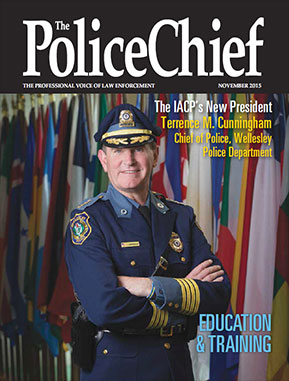
November 2015
The education and training of police officers fulfills many essential roles. Appropriate education and training can improve tactical skills, increase officer safety and well-being, serve as a legal defense, build skills such as empathy and discretionary decision making, and enhance police legitimacy. It can come in many forms—college degree programs, police academies, in-service training, and specific courses and modules designed for law enforcement—but it’s of importance to all officers, from executive personnel to recruits.
Cover photo by Roger Pelissier Portrait Photography, Wellesley, Massachusetts
Articles
-
Is Law Enforcement Training Affective Enough?
Recent events in the law enforcement arena have highlighted very serious issues concerning the behavior, attitudes, and beliefs of some law enforcement professionals sworn to protect the public. A his... -
Training to Work Effectively with Youth: Reflect on the Past and Retool for the Future
Once upon a time, there was a uniform that commanded respect and communicated trust. A few words and a stern look from the officer wearing the uniform could often be counted on to correct a youth’s ... -
FBI Investigative Technology Training: Preparing Officers for Investigating Cybercrimes
State and local law enforcement agencies are increasingly responsible for addressing cybercrime. All departments, even small departments in remote areas, need (or will need) investigators equipped wit... -
SELECTING IN Recruits: Identifying Traits and Characteristics Indicative of Florida Highway Patrol Training Academy Success
Law enforcement agencies across the United States are facing a shared challenge: recruiting and retaining qualified personnel in sworn positions. The public’s perception of law enforcement has chang... -
Ensuring Future Stability through Law Enforcement Partnerships
Interoperability is the ability of a system to work with or use the parts or equipment of another system; it is also the goal and end state for all theater security cooperation exercises that take pla... -
Criminal Justice Degree Programs: Education with a Purpose
When asking criminal justice students on the first day of class what their career objectives are, the instructor should be prepared for a wide variety of responses. Not many students in the course wil... -
Ideas & Insights: Police CEOs: Agents of Change?
Police organizations and their leaders are often characterized as resistant to change. This school of thought holds that police administrators cling to old ways, and, if they do make changes, they are... -
Ideas & Insights: Chiefs as Change Agents
An often-heard lament of police chiefs is that police officers hate two things—the way things are and change. Stephen Mastrofski’s -
Unconstitutional Policing: Part 3–A Failure To Train Is Compensable Liability
There is no debating that law enforcement is one of the noblest of professions. Yet the evolving demands of the job appear to be increasingly diametrically opposed now more than ever. The perceived pa... -
Gaining a Global Perspective: The IACP Visiting Fellows Program
The International Association of Chiefs of Police (IACP) Visiting Fellows program allows the association to create a collaborative environment at headquarters (HQ) where professional staff and active ...
Columns
- President's Message: The Year Ahead
- Legislative Alert: Sentencing Reform Legislation Introduced
- Chief's Counsel: Heien v. North Carolina: What is a Reasonable Mistake of Law?
- Technology Talk: Big Data: A Law Enforcement Tool the Public Supports
- Operation SPIDRE: Maryland’s Approach to High-Visibility Enforcement of Impaired Driving Laws
- November 2015 LODD
- November 2015 Product Update
- November 2015 Index to Advertisers
- Product Feature: Biometrics Blends Time-Honored Tradition with Glimpses of the Future
- Officer Safety Corner: Law Enforcement Firearms Range Medical Preparedness
- IACP Working For You November 2015
- Research in Brief: Police Legitimacy, Procedural Justice, and the Exercise of Police Authority

